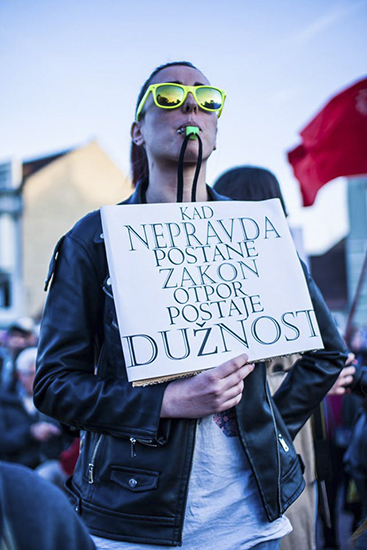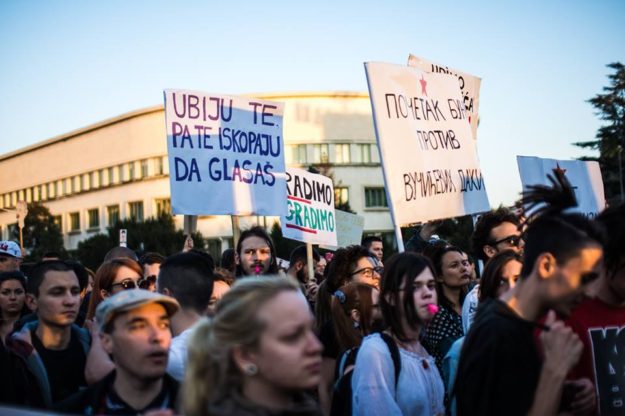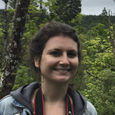Months after the biggest protests in Belgrade since the 1990s, the same streets still echo with the words that reverberated in early April: spontaneous, huge, fresh, revolutionary…
Drinking coffee in Republic Square, one almost expects the clattering of the cups to turn into the stamping of people’s feet, marching against the alleged dictatorship. But instead, glasses clink, forks scratch the surface of the plates, people laugh, and cheer. Life in Belgrade has continued as normal.
The protests stopped as spontaneously as they had started, turning the idea of an awakened, engaged society into some kind of an urban legend. As researcher from the University of Belgrade, Aleksandar Matkovic, puts it: “The protests were paradoxical: one day you had a few thousand people in the streets and the next day you had zero.”
#againstdictatorship
In early April, an active and engaged citizenry in Serbia was seemingly ignited overnight. On Sunday, April 2, people went to bed with a newly elected president, the former prime minister, Aleksandar Vucic. On Monday they woke up to a Facebook event, calling for demonstrations all over the country under the name ‘protiv diktature’ — ‘against dictatorship.’
Student Aleksandra Nedeljkovic took part in the protest and was surprised how many people joined the movement. “Lots of people responded to the invitation, but no one was certain how many people would show up,” she explains.
Aleksandar Matkovic, from the Institute for Philosophy and Social Theory, couldn’t imagine the scope of what a single social media event did to society. “I never saw that many protesters in my life in this region, there wasn’t an empty street,” the researcher almost shouts, remembering the empowerment he felt on April 3.

The protests spread to other cities including Novi Sad, where protesters proclaimed: “When injustice became the law, resistance became duty.”
Student Vuk Velebit was startled by this sudden activism, that seemingly bombarded him from every angle. His prime reaction was disbelief at the openness of the rebellion, the transparency of the events, almost imagining it was some kind of trap. “What was really strange to me, and to other people, was to hear that 10,000 people were on the streets the day after the elections. That is why I only joined on the third day,” he admits ashamedly.
"With the victory of Vucic many things in Serbia lost meaning and the only meaning many could find was on the streets."
Aleksandra Nedeljkovic, a student who took part in the protests.
Nedeljkovic remembers the demonstrations as being a cocktail of anger and fear, mixed with “a positive, heartening” atmosphere. “We saw we were not alone,” she recalls. “With the victory of Vucic, many things in Serbia lost meaning and the only meaning many could find was on the streets.”
The activist still cannot shake off how “defeated and broken” she felt when Vucic claimed victory. “I stepped onto the streets because I wanted our voice to be heard as well,” she states. “I wanted everyone to see there was more than one opinion in Serbia. I just wanted Serbia to start waking up.”
And the world came tumbling down
Yet, the spark from the beginning has slowly died out. Findings from a recent poll conducted by the Center for Free Election and Democracy (CeSID) reveals that 38 percent of those asked said they oppose the protests, while only 25 percent were in favour.
Dusan Spasojevic, a professor from the University of Belgrade, believes that the lack of support for the protests may be explained by the quarrels and dysfunctional nature of the protests as they reached their conclusion.
“What went wrong with the protests is that they started with four demands connected to election fraud,” the professor states. “But after a few days they added seven demands and they wanted to change the world.”

As the demands of the protest diversified, the public mass broke off into different factions.
Even some of the protesters seemed unsure of their aims, as the initial dissatisfaction with the results of the presidential elections turned into protests against the strong hand of Vucic. The situation got even more complex after the protesters split into three groups. The ‘Seven demands’ group believed President Vucic was not as big a problem as the socio-economic issues in the country; while another faction, under the ‘Protiv diktatur’ name, took control of the Facebook page and the email address, sticking to the primary four reasons for the demonstrations. A third group was made up of arts students affiliated with the Protiv diktatur movement, leading a campaign called ‘Culture against dictatorship.’
But the biggest trap the public gatherings could not escape from was the lack of organization. The original initiative was not to include any politicians in the protests, which, according to Sofija Mandic from the Belgrade Centre for Security Policy (BCSP), comes from “the idea that politicians are dirty.” Mandic believes that “the argument of the power of the mass is valid but temporary, in the long run we need [political] cooperation or we are going in the wrong direction.”
Spasojevic agrees, stating that “as a political player you need to provide incentives for people to go out. Those protests were interesting for a few days, but you need a structure […] some kind of organization, not even leadership but organization, and they were arguing between themselves.”
However, protester Nedeljkovic disagrees with these explanations. “The people didn’t need a shepherd to lead them,” she argues, adding that, for her, even the appearance of three factions or the lack of response were not “instrumental to the protests dwindling number of participants.”
Mandic also offers another reason for the short-lived nature of the protests, pointing to the gap between the President and the demands of his population. For her, the energy of the protests was like a flame, a flame that the indifference of the regime finally extinguished. Vuk Velebit agrees. “He acted very smart, at the beginning he made some comments, but afterwards he just pretended that nothing was going on, just ignoring it.”
A puppet master’s reformed society
Despite their petering out, Aleksandar Matkovic believes that the protests won some important victories. “People went to a public space with real demands, to criticise everything and it’s just the beginning,” he says. “We broke this barrier and everybody knows that if they want to win elections, they will have to fulfil their social duties or people will take it to the streets. The protests finally made people do something, shout on the streets.”
“It’s good to not fear, a years ago people were very scared. Somehow, this fear was broken and this is really good for democracy.”
Youth Initiative for Human Rights (YIHR) director Anita Mitic.
The change that came with protests has spread happiness amongst activists and NGOs. A veteran of that world, Anita Mitic from the Youth Initiative for Human Rights, believes they were invigorating and have provided optimism. “It’s good to not fear, a years ago people were very scared. Somehow, this fear was broken and this is really good for democracy,” she states.
But recent findings of the CeSID public poll suggest the contrary. 57 percent of Serbians say they will not take part in future protests, while another 20 percent will go to the streets primarily for economic reasons, with only four percent of those asked stating they will protest for political reasons.
The results of the public poll are not surprising. Aleksandar Vucic won, fraudulently or not, more than 50 percent of votes, showing a degree of polarisation in the society between those who see him as a dictator and those who see him as a needed strong leader.
One such supporter is Vlada Cuk, a 33 year-old lawyer, who thinks of Vucic’s politics as firm, and based on the development of the economy not only of Serbia, but the whole region. His vote went to the new president, because he sees him as non-nationalist, who could bring stability to the Balkans.
Indeed, the rise of Aleksandar Vucic has not been the result of a coup, but through a slow process of accumulating more and more power. The 47-year-old spent almost two decades in politics and people were familiar with his gaining of control over all three branches of Serbian government.
Ironically, Western leaders see the new president as a stable hand, trusting him with building an economic union between the former Yugoslav republics.
Mandic portrays Serbia as a society with a dangerous habit of waiting for the final straw to snap. “This happened piece by piece, we have the culture of protest but not for little things,” she explains. “Maybe we need to build a culture of protest for some smaller pieces of the puzzle. […] It seems that we don’t learn very much, we’re always in the same situation, we don’t react on time.”
The protests were ignited after Vucic’s ascent into the presidential office, once again denting the fragile notion of stability in the Balkans. Ironically, Western leaders see the new president as a stable hand, trusting him with building an economic union between the former Yugoslav republics. Aleksandra Nedeljkovic defends her participation in the protests, pointing out how “Vucic presents himself as a stability factor only by creating problems which he reacts to solve.”
No opposition, no option?
The protests also revealed another interesting trend, which Mitic diagnoses as “schizophrenia.” She insists that “people are dying for new faces,” and yet they keep on voting for Aleksandar Vucic and his Progressive party. The underlying basis of such a tendency is the underrepresentation young people in Serbia might feel. According to Sofija Mandic, Vucic occupied the majority of the media during the campaign, stifling even more the almost invisible opposition.
Coming back to what the protests achieved, the general mood of change goes even further. Professor Spasojevic sees an opportunity for a future opposition, emerging from the awakened society. He anticipates next year’s local elections excitedly, predicting a probable loss for the Progressive party.
“This is the first chance for opposition,” he claims. “Vucic is a control freak and if he loses Belgrade, he will start panicking, and Belgrade will be the place for a growing opposition.” His predictions point to a probable descent of the President, which was after all the trigger for this year’s April demonstrations.
That the protests were the first step on a long road is a view echoed by protester Nedeljkovic. “We didn’t think we would stop the inauguration with these protests,” she says. “We understood from day one this would be a long-fought battle. Changes will come when the system changes and the citizens of Serbia wake up.”K
Photographs courtesy of protest participants.




